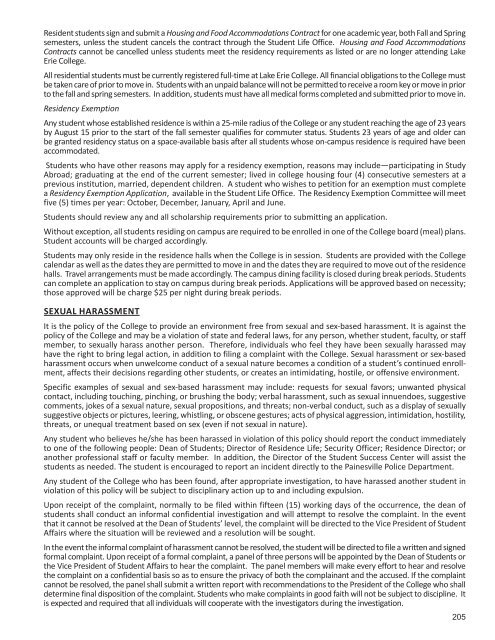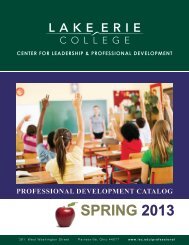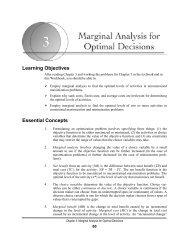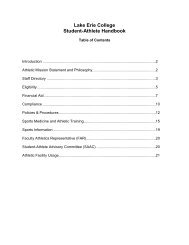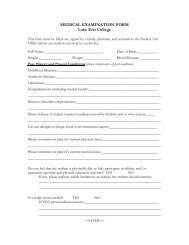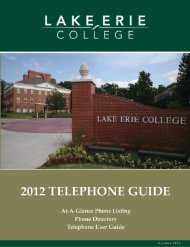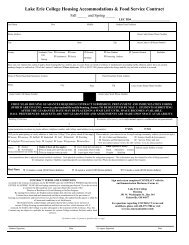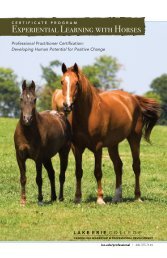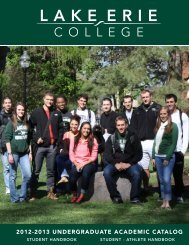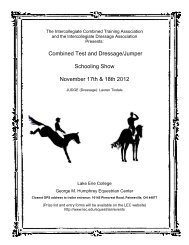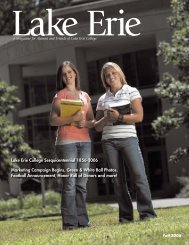Undergraduate Catalog - Lake Erie College
Undergraduate Catalog - Lake Erie College
Undergraduate Catalog - Lake Erie College
You also want an ePaper? Increase the reach of your titles
YUMPU automatically turns print PDFs into web optimized ePapers that Google loves.
Resident students sign and submit a Housing and Food Accommodations Contract for one academic year, both Fall and Spring<br />
semesters, unless the student cancels the contract through the Student Life Office. Housing and Food Accommodations<br />
Contracts cannot be cancelled unless students meet the residency requirements as listed or are no longer attending <strong>Lake</strong><br />
<strong>Erie</strong> <strong>College</strong>.<br />
All residential students must be currently registered full-time at <strong>Lake</strong> <strong>Erie</strong> <strong>College</strong>. All financial obligations to the <strong>College</strong> must<br />
be taken care of prior to move in. Students with an unpaid balance will not be permitted to receive a room key or move in prior<br />
to the fall and spring semesters. In addition, students must have all medical forms completed and submitted prior to move in.<br />
Residency Exemption<br />
Any student whose established residence is within a 25-mile radius of the <strong>College</strong> or any student reaching the age of 23 years<br />
by August 15 prior to the start of the fall semester qualifies for commuter status. Students 23 years of age and older can<br />
be granted residency status on a space-available basis after all students whose on-campus residence is required have been<br />
accommodated.<br />
Students who have other reasons may apply for a residency exemption, reasons may include—participating in Study<br />
Abroad; graduating at the end of the current semester; lived in college housing four (4) consecutive semesters at a<br />
previous institution, married, dependent children. A student who wishes to petition for an exemption must complete<br />
a Residency Exemption Application, available in the Student Life Office. The Residency Exemption Committee will meet<br />
five (5) times per year: October, December, January, April and June.<br />
Students should review any and all scholarship requirements prior to submitting an application.<br />
Without exception, all students residing on campus are required to be enrolled in one of the <strong>College</strong> board (meal) plans.<br />
Student accounts will be charged accordingly.<br />
Students may only reside in the residence halls when the <strong>College</strong> is in session. Students are provided with the <strong>College</strong><br />
calendar as well as the dates they are permitted to move in and the dates they are required to move out of the residence<br />
halls. Travel arrangements must be made accordingly. The campus dining facility is closed during break periods. Students<br />
can complete an application to stay on campus during break periods. Applications will be approved based on necessity;<br />
those approved will be charge $25 per night during break periods.<br />
Sexual Harassment<br />
It is the policy of the <strong>College</strong> to provide an environment free from sexual and sex-based harassment. It is against the<br />
policy of the <strong>College</strong> and may be a violation of state and federal laws, for any person, whether student, faculty, or staff<br />
member, to sexually harass another person. Therefore, individuals who feel they have been sexually harassed may<br />
have the right to bring legal action, in addition to filing a complaint with the <strong>College</strong>. Sexual harassment or sex-based<br />
harassment occurs when unwelcome conduct of a sexual nature becomes a condition of a student’s continued enrollment,<br />
affects their decisions regarding other students, or creates an intimidating, hostile, or offensive environment.<br />
Specific examples of sexual and sex-based harassment may include: requests for sexual favors; unwanted physical<br />
contact, including touching, pinching, or brushing the body; verbal harassment, such as sexual innuendoes, suggestive<br />
comments, jokes of a sexual nature, sexual propositions, and threats; non-verbal conduct, such as a display of sexually<br />
suggestive objects or pictures, leering, whistling, or obscene gestures; acts of physical aggression, intimidation, hostility,<br />
threats, or unequal treatment based on sex (even if not sexual in nature).<br />
Any student who believes he/she has been harassed in violation of this policy should report the conduct immediately<br />
to one of the following people: Dean of Students; Director of Residence Life; Security Officer; Residence Director; or<br />
another professional staff or faculty member. In addition, the Director of the Student Success Center will assist the<br />
students as needed. The student is encouraged to report an incident directly to the Painesville Police Department.<br />
Any student of the <strong>College</strong> who has been found, after appropriate investigation, to have harassed another student in<br />
violation of this policy will be subject to disciplinary action up to and including expulsion.<br />
Upon receipt of the complaint, normally to be filed within fifteen (15) working days of the occurrence, the dean of<br />
students shall conduct an informal confidential investigation and will attempt to resolve the complaint. In the event<br />
that it cannot be resolved at the Dean of Students’ level, the complaint will be directed to the Vice President of Student<br />
Affairs where the situation will be reviewed and a resolution will be sought.<br />
In the event the informal complaint of harassment cannot be resolved, the student will be directed to file a written and signed<br />
formal complaint. Upon receipt of a formal complaint, a panel of three persons will be appointed by the Dean of Students or<br />
the Vice President of Student Affairs to hear the complaint. The panel members will make every effort to hear and resolve<br />
the complaint on a confidential basis so as to ensure the privacy of both the complainant and the accused. If the complaint<br />
cannot be resolved, the panel shall submit a written report with recommendations to the President of the <strong>College</strong> who shall<br />
determine final disposition of the complaint. Students who make complaints in good faith will not be subject to discipline. It<br />
is expected and required that all individuals will cooperate with the investigators during the investigation.<br />
205


